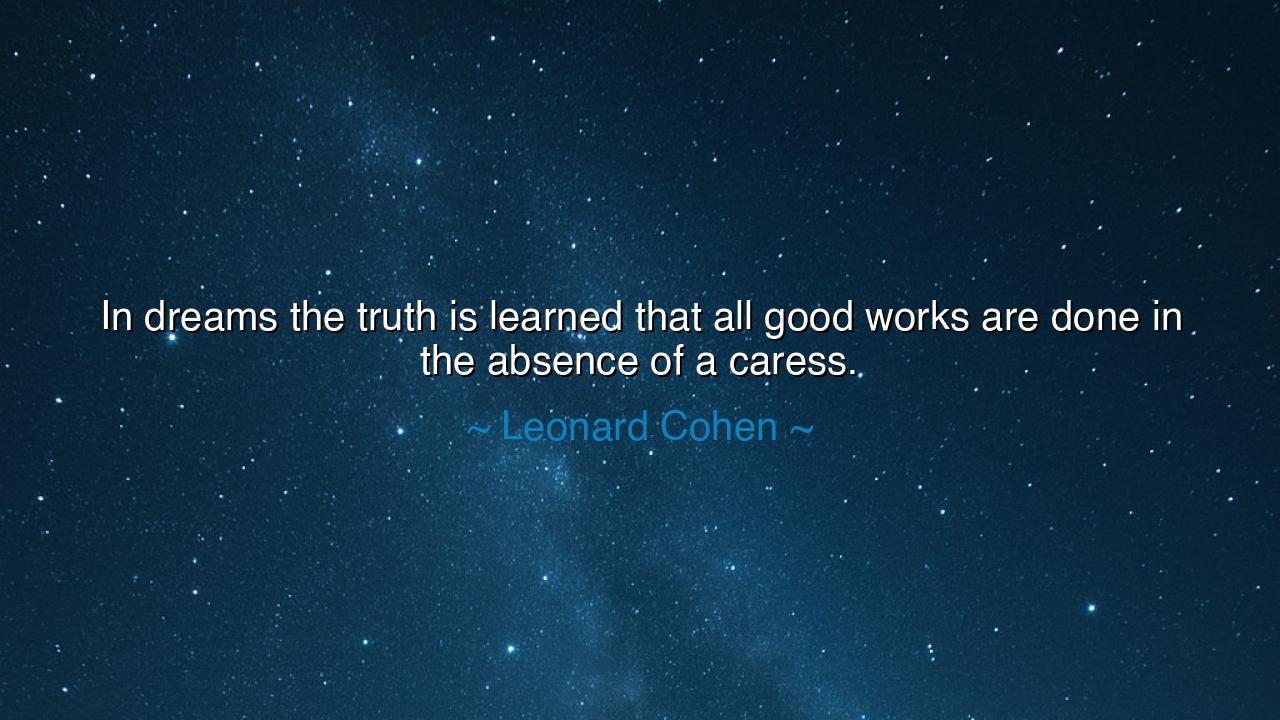
In dreams the truth is learned that all good works are done in
In dreams the truth is learned that all good works are done in the absence of a caress.






In these haunting and tender words, Leonard Cohen, poet of longing and prophet of the human soul, reveals one of life’s quietest truths: “In dreams the truth is learned that all good works are done in the absence of a caress.” It is a sentence woven of sorrow and wisdom — the voice of one who has walked through love, loss, and faith and seen that the purest deeds are often born in solitude. Cohen, whose songs mingled holiness with heartbreak, speaks here of the deep mystery of virtue: that goodness, when it is true, is done not for reward, not for praise, not even for love returned, but because it must be done.
To act rightly without a caress — without comfort, approval, or affection — is to stand in the pure light of integrity. The dream Cohen speaks of is not the fantasy of sleep, but that inner vision where truth reveals itself when all distractions fade. In dreams, stripped of pride and audience, we see the naked shape of the soul. It is there we learn that kindness means most when no one sees, that forgiveness matters when it is not acknowledged, that sacrifice has its greatest worth when it brings no embrace in return. Good works, to Cohen, are born in silence, nurtured by the hands of those who love the good itself more than its recognition.
There is a quiet heroism in such solitude. Consider the life of Mother Teresa, who served the dying and destitute in the slums of Calcutta. To the world, she was a saint wrapped in light, but her private letters revealed decades of inner darkness — a sense of distance from the very God she served. And yet she continued, day after day, washing wounds, lifting the forgotten, speaking words of comfort she herself could not feel. That is the meaning of Cohen’s truth: she worked without the caress, without assurance of divine tenderness, yet her faith was made purer by the absence of it. Love, in its highest form, is not emotion but endurance.
This insight belongs not only to saints, but to all who labor in quiet fidelity. The artist who paints though no one buys his work; the parent who rises before dawn to feed a child who never says thank you; the worker who does what is right though no one notices — all these souls live Cohen’s lesson. The world measures success by applause, but the heavens measure it by perseverance. To do good while unseen is to share in the divine act of creation — to give without asking, to love without need, to shine without witness.
Cohen, who wrestled with the loneliness of faith, understood that the human heart often seeks love as payment for virtue. But true goodness asks for nothing. The absence of a caress is not punishment — it is purification. It strips away the lesser motives, leaving only the sacred fire of purpose. In this way, Cohen’s words echo the mystics of old — those who taught that the path to enlightenment leads through the desert of the heart, where love is tested by silence, and where devotion is proved not by comfort but by constancy.
Even the great prophets and creators knew this ache. Vincent van Gogh, tormented and unseen in his time, painted visions of eternity in solitude and despair. His letters reveal a soul that yearned for understanding and affection — yet the truth of his art came only through the crucible of isolation. Each brushstroke, each swirling star, was an offering given without the warmth of a caress. Only after his death did the world see what his loneliness had created: beauty forged from abandonment, compassion painted by a trembling hand that never stopped giving.
So, my child, remember this when the world feels cold and indifferent: do not cease your good works simply because no one touches your hand. The absence of affection does not mean the absence of meaning. The dream Cohen speaks of is the soul’s awakening — the moment you realize that the good you do in secret is eternal, while the praise you seek will fade like smoke. Keep building, keep serving, keep loving, even when no one watches. For the measure of a heart is not in how much it is comforted, but in how much it continues to give when comfort is gone.
And thus, the final wisdom: all true goodness is solitary before it becomes sacred. The dream teaches what waking life forgets — that the divine does not always caress, but always sees. So labor on in silence, with faith as your companion. For in the absence of a caress, the soul learns the meaning of love itself — a love vast, eternal, and unbound by the touch of any hand.






AAdministratorAdministrator
Welcome, honored guests. Please leave a comment, we will respond soon